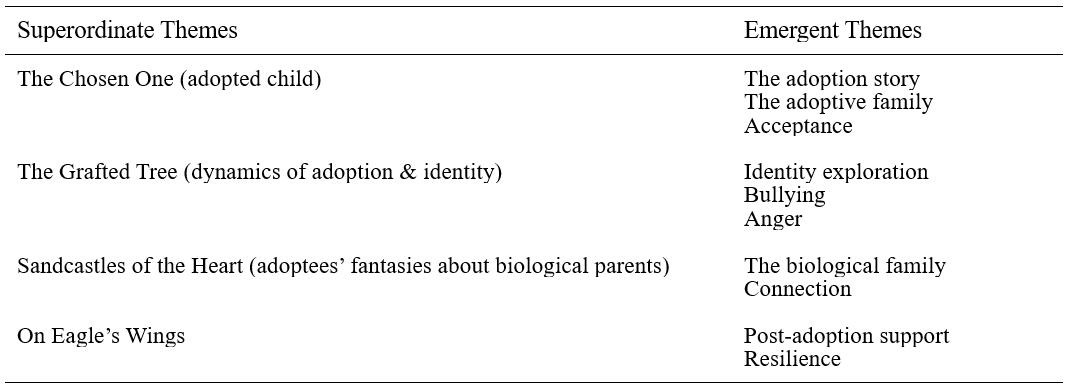The Lived Experience of Being an Adoptee
Abstract
Adoption can initiate many sentiments. Notable differences between adopted and nonadopted children are clearly indicated in research. Because limited research looks at the gradual development of the adoptee, this research looked at the lived experiences of Maltese adoptees and their coping mechanisms.
Following Smith and Osborn (2015) guide on interpretative phenomenological approach, six participants shared their experiences in semi-structured interviews conducted remotely.
Four superordinate themes and ten subordinate themes emerged from the data analysis.
Findings showed unique ways by adoptees to accept the often challenging reality of the adoption process. Resilience was clearly what led adoptees moving on with life. Society and related bodies are therefore called to avail professional services to assist adoptees in their coping of a painful past.
References
Bowlby, J. (1969). Attachment and loss. Hogarth Press. 101 Brinich, P. (1990). Adoption, ambivalence, and mourning: Clinical and theoretical interrelationships. Adoption & Fostering, 14(1), 6-17. https://doi.org/10.1177/030857599001400104
Carpenter, J. (2008). Metaphors in qualitative research: Shedding light or casting shadows? Research in Nursing & Health, 31(3), 274-282. https://doi.org/10.1002/nur.20253
Cassar, L. (2013). The primal wound : exploring the experience of individuals adopted as children. University of Malta; Faculty for Social Wellbeing. Department of Psychology, 102.
Darnell, F. J., Johansen, A. B., Tavakoli, S., & Brugnone, N. (2017). Adoption and identity experiences among adult transnational adoptees: a qualitative study. Adoption Quarterly, 20(2), 155-166. https://doi.org/10.1080/10926755.2016.1217574
Finley, G. E. (2003). Adoption: In Whose Best Interest? Adoption Quarterly, 7(1), 1-6. https://doi.org/10.1300/J145v07n01_01
Flaherty, S. C., & Sadler, L. S. (2011). A review of attachment theory in the context of adolescent parenting. Journal of Paediatric Health Care: Official Publication of National Association of Paediatric Nurse Associates & Practitioners, 25(2), 114-121. https://doi.org/10.1016/j.pedhc.2010.02.005
Fronek, P., & Briggs, L. (2018). A Qualitative Exploration of the Adult Intercountry Adoptee Experience in Australia. Adoption Quarterly, 21(3), 161-181. https://doi.org/10.1080/10926755.2018.1488330
Holloway, I., & Freshwater, D. (2007). Vulnerable story telling: Narrative research in nursing. Journal of Research in Nursing, 12(6), 703-711. https://doi.org/10.1177/1744987107084669105
Hughes, D. A. (1999). Adopting children with attachment problems. Child Welfare, 78(5), 541-560. PMID: 10501012
MacDonald, M., & McSherry, D. (2011). Open adoption: Adoptive parents’ experiences of birth family contact and talking to their child about adoption. Adoption and Fostering, 35, 8-16. https://doi.org/10.1177/030857591103500302
March, K., & Miall, C. (2000). Introduction: Adoption as a Family Form. Family Relations, 49(4), 359-362. Retrieved from: https://www.jstor.org/stable/585830
Matheson, K., Asokumar, A., & Anisman, H. (2020). Resilience: Safety in the aftermath of traumatic stressor experiences. Frontiers in Behavioural Neuroscience, 14. https://doi.org/10.3389/fnbeh.2020.596919
McAdams, D. P. (2001). The psychology of life stories. Review of General Psychology, 5(2), 100-122. https://doi.org/10.1037/1089-2680.5.2.100
National Statistics Office, Malta. (2010). Retrieved from https://nso.gov.mt/en/publicatons/Publications_by_Unit/Documents/D2_Dissemination_Unit/Malta_in_Figures_2010.pdf
Oostdijk, N. H. J. (2011). The dynamics of linguistic variation: Corpus evidence on English past and present edited by Terttu Nevalainen, Irma Taavitsainen, Päivi Pahta and Minna Korhonen. https://doi.org/10.1111/j.1467-9841.2011.00482.x108
Parahoo, K. (2006). Nursing research principles, process and issues (2nd ed.). Palgrave Macmillan. Patino, C., & Ferreira, J. (2018). Inclusion and exclusion criteria in research studies: definitions and why they matter. Jornal Brasileiro De Pneumologia, 44, 84-84. https://doi.org/10.1590/s1806-37562018000000088
Pringle, J., Drummond, J., McLafferty, E., & Hendry, C. (2011). Interpretative phenomenological analysis: A discussion and critique. Nurse Researcher, 18(3), 20-24. https://doi.org/10.7748/nr2011.04.18.3.20.c8459
Reynolds (Taewon Choi), J. D., Elimelech, N. T., Miller, S. P., Ingraham, M. E., Anton, B. M., & Bhattacharjee, C. (2021). In Their Own Voices: Identity and Racial Socialisation Experiences of Young Adult Chinese Adoptees. Review of General Psychology, 25(1), 85-100. https://doi.org/10.1177/1089268020963597
Reynolds, J., Ponterotto, J., & Lecker, C. (2016). Displacement, Identity and Belonging for Ibyangin: The Personal Journey of Transracial Korean-Born Adoptees. Qualitative Report, 21(2), 228. https://doi.o10.46743/2160-3715/2016.2197
Scarvelis, B., Crisp, B. R., & Goldingay, S. (2017). From institutional care to life in an Australian family: The experiences of intercountry adoptees. International Social Work, 60(2), 423-434. https://doi.org/10.1177/0020872815580048
Smith, J. A., & Osborn, M. (2015). Interpretative phenomenological analysis as a useful methodology for research on the lived experience of pain. British Journal of Pain, 9(1), 41–42. https://doi.org/10.1177/2049463714541642111
Smith, J., Flowers, P., & Larkin, M. (2009). Interpretative Phenomenological Analysis: Theory, Method and Research: London: Sage. Taylor & Francis Group. https://doi.org/10.1080/14780880903340091
Verrier, N. W. (2003). The Primal Wound: understanding the adopted child. Gateway Press.
Walker, J. (2008). The Use of Attachment Theory in Adoption and Fostering. Adoption & Fostering, 32(1), 49-57. https://doi.org/10.1177/030857590803200107112
Walton, J. (2015). Feeling It: Understanding Korean Adoptees’ Experiences of Embodied Identity. Journal of Intercultural Studies, 36(4), 395-412. https://doi.org/10.1080/07256868.2015.1049985
Wegar, K. (2000). Adoption, Family Ideology, and Social Stigma: Bias in Community Attitudes, Adoption Research, and Practice. Family Relations, 49(4), 363-369. https://doi.org/10.1111/j.1741-3729.2000.00363.x
Zammit, S. (2022). Only 27 Maltese children were adopted in the last decade. The Malta Independent. Retrieved from https://www.independent.com.mt/articles/2022-06-18/local-news/Only-27-Maltese-children-adopted-in-the-last-decade-6736243814


This work is licensed under a Creative Commons Attribution 4.0 International License.
Copyright for this article is retained by the author(s), with first publication rights granted to the journal.
This is an open-access article distributed under the terms and conditions of the Creative Commons Attribution license (http://creativecommons.org/licenses/by/4.0/).









1.png)














